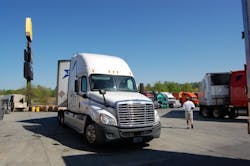I know, I know; with the first federal government shutdown upon us in 17 years – and with no doubt plenty of economic shocks to follow after it – alongside the official rollout of ObamaCare, one would think this is not the time to blather on about a supposed “soft skills” gap growing within the American labor force.
Yet trucking companies can ill afford to ignore such portents, especially as a shortage of truck drivers is only expected to intensify over the next few years – a shortage driven in part by a surge in regulatory initiatives that require a goodly number of “soft skills” to endure.
“Soft skills,” by the way, is a term that refers to things such as communication, critical thinking, creativity, and collaboration; all attributes needed by the truck drivers of today and tomorrow, especially in terms of building relationships with customers, dealing with intrusive government rules, and trying to find on their own ways to boost efficient equipment operation.That at least is some of where my thinking on “soft skills” applies to trucking; and it’s also why, more broadly, it’s the growing lack of such skills that’s worrying a lot of senior executives across the U.S. business spectrum.
That at least is one of the main findings extracted from the State of the Economy and Employment survey conducted by the employment firm Adecco Staffing US. Their poll of 500 senior U.S. executives found that 92% of them acknowledge there is a serious gap in workforce skills, and for all the traditional talk about a skills gap in technical and computer skills, 44% of respondents cited “soft skills” as the area with the biggest gap.
In fact, only 22% cited a lack of technical skills as the culprit for the U.S. skills gap – with leadership (14%), and computer skills (12%) the next two biggies. When it does come to the gap in computer skills, Gen X executives – more than any other generation surveyed – are most likely (21%) to believe this is the skill that most seriously affects the U.S. workforce, noted Janette Marx, Adecco’s senior VP.As for business implications related to the U.S. gap in skills, the survey found that the majority (64%) of senior executives who believe there is a skills gap feel the greatest threat to U.S. businesses is investment going to companies abroad instead of staying in U.S. – with 34% believing the U.S. gap in skills poses a threat to research and development capabilities as well.
"It's interesting to see how the definition of the skills gap has evolved from being so heavily focused on technical and computer skills to 'soft' skills related to communication and creativity," Marx added. "Educational institutions may overlook these elements in today's digital age, but schools must integrate both hard and soft skill sets into their curriculums, which in turn will help better prepare candidates and strengthen our country's workforce."
Here are some other findings, which shouldn’t surprise many in trucking, one would think:
- The U.S. education system needs to better prepare future generation of workers. According to Adecco’s survey, more than half (59%) of respondents do not believe colleges and universities in the U.S. offer curriculums that adequately prepare students for today's workforce.
- Apprentice/training programs could be a solution. Among those respondents who said there is a skills gap in the U.S. workforce, 89% believe corporate apprenticeships or training programs could help alleviate the problem (can you say “company-owned and operated trucking school” perchance?). Yet 42% said the greatest barrier to creating in-house training programs is the cost of development.
- Manufacturing suffering most from the “skills gap.” Of those who believe there is a skills gap in the U.S, 30% said it most affects the manufacturing industry. Other industries cited included technology (21%) and professional and business services (19%).
Interestingly, Marx noted that as dire as the need is for skilled workers in the U.S., senior executives did not feel the skills gap poses a direct threat to the U.S. economy – only 13% cited it as a major concern. Instead federal spending (24%), global competition (22%) and high unemployment (20%) were called out as what they feel are the greatest threats to the U.S. economy.
"Although there many issues affecting our economy, the gap in skills in the U.S. workforce remains important and should be properly addressed so that it doesn't do irreparable harm to our overall workforce," she pointed out. "We must look to develop employees that have a solid combination of the hard and soft skills that are necessary to succeed today and in the future."
Something to think about as carriers contemplate ways to staff their ranks today but especially for tomorrow as well..


